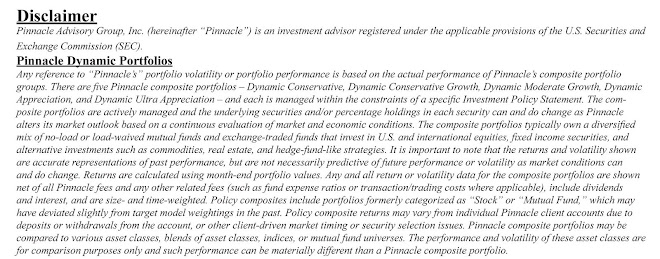Last week I had the privilege of traveling to Bachelor’s Gulf in Colorado to network with some of Charles Schwab’s largest institutional clients. I’m guessing about 100 firms from around the country attended the Explore conference and the total assets under management represented by everyone who attended was more than $200 billion. As is usually the case in these kinds of conferences, the conversation swirled around topics involving leadership skills, business succession plans, incentive compensation schemes, and other topics of interest to business owners who suddenly find themselves managing businesses that most people would no longer consider to be “small.” In fact having $1 billion under management is , to steal a phrase from PIMCO, “the new normal” for firms that have been in business for fifteen years or longer. Pinnacle certainly fits the description.
As usual the one topic that was not discussed was how the different firms invest money. You would think after a decade of horrible returns that investment strategy would be at the top of the list but that is rarely the case, and the Explore Conference was no exception. However, I thought it was notable that two of the speakers focused on political issues that might impact our business. David Brooks, the well-known Op-Ed columnist for the N.Y. Times, and Greg Valliere, the analyst with the Washington Research Group and commentator for CNBC, spoke to the group in two different sessions focused on recent political events. The current debt ceiling debate was uppermost on everyone’s mind, followed by who might be the Republican Party candidate for president in the upcoming election. Of the two speakers, it was Brooks who managed to shock the audience with his comments about the debt ceiling debate.
Greg Valliere’s view about the debt ceiling debate was pretty much consensus, meaning that we are going to be in for a lot of political theatre leading up to the August 2 deadline but all the parties know that a deal has to be cut in order to prevent a possible economic catastrophe with the nation’s creditors. Brooks offered his view that a deal wouldn’t be cut and gave several plausible reasons why that could occur. You could almost feel the air leave the room as the audience contemplated what a default on U.S. Treasury debt might mean to our managed assets. If the market is at all concerned about Brook’s point of view, you wouldn’t know it from last week’s market action as the risk-on trade was definitely back “on” last week. However, Investors should be ready for extreme market volatility throughout the summer depending on what the headlines bring regarding the debt ceiling debate. Hopefully Brooks is wrong but I am reminded that hope is not the best investment strategy.
skip to main |
skip to sidebar
Subscribe via email
Who is Echoing from the Pit
This blog represents the individual opinions of the Investment Team at Pinnacle Advisory Group in Columbia, Maryland
The Investment Team comprises:
Ken Solow, CFP, CLU, ChFC
Rick Vollaro, CPA
Carl Noble, CFA
Sean Dillon
Sauro Locatelli
To learn more about Pinnacle please visit our website at http://www.pinnacleadvisory.com/
The Investment Team comprises:
Ken Solow, CFP, CLU, ChFC
Rick Vollaro, CPA
Carl Noble, CFA
Sean Dillon
Sauro Locatelli
To learn more about Pinnacle please visit our website at http://www.pinnacleadvisory.com/
About Me
- Echoes from the Pit
- Columbia, Maryland, United States
Pinnacle in the News
Blog Archive
-
▼
2011
(169)
-
▼
July
(13)
- Risks Inherent in Risk Protection
- Triple Digit Oil - Again
- Debt Ceiling Q&A
- On Politics
- Finally Growing into “The New Normal”
- Tail Risks
- The Hathaway Effect
- As the Government Turns…
- Was It Ever In Doubt?
- Earth to Jobs, Where Are You?
- Big Week but We Need Bigger
- $200 Billion in the Room
- New Holding: Aerospace and Defense ETF
-
▼
July
(13)

